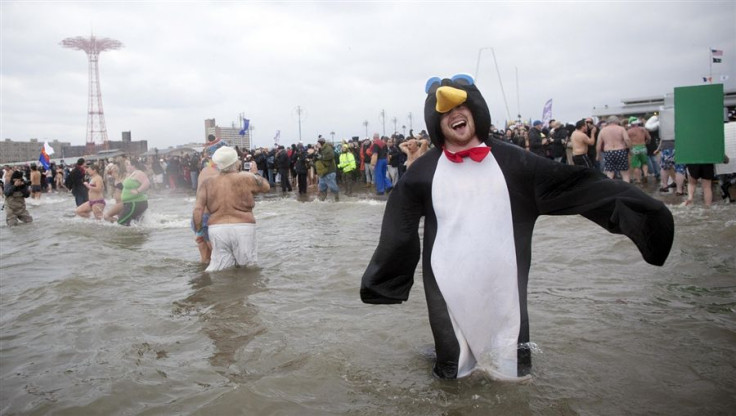Polar Bear Plunge Physiology: What A Cold Water Dip On New Year's Day Does To Your Body

In New York City, it’s only about an hour on the Q train from the crush of New Year’s Eve parties at Times Square to Coney Island, where hundreds of people are expected to rush into the Atlantic Ocean on Jan. 1. All across the globe, folks fortified with courage (liquid or otherwise) will splash into lakes and oceans to start 2014 off with a shiver. While a “polar bear plunge” can be an invigorating start to the year, you might wonder: What actually happens to your body when you take a freezing dip?
Cold water swimming enthusiasts love the rush that comes with a near-freezing dip. And a polar bear plunge does do lots of things to make you feel invigorated, says Christopher Tedeschi, an emergency physician at Columbia University Medical Center. But from your body’s perspective, a racing heart and gasping breath signal not so much excitement as self-preservation.
It doesn’t even take near-freezing water to provoke a physiological response – anything under 70 degrees Fahrenheit can be considered “cold,” according to Tedeschi. Hypothermia won’t set in unless you plan on floating around for around an hour, but your body will still react very quickly to a sudden immersion.
“What happens in the first one to two minutes is what we call the cold shock response,” Tedeschi says. “Your body reacts by getting very revved up.”
The first and most immediate sign of this metabolic turbo-drive can be seen in the respiratory system. As soon as a person rushes or jumps into frigid water, he begins taking big gasps of breath. If a person can’t get his breathing under control, he might start to hyperventilate within a minute or so.
In those first few minutes, your core body temperature won’t change very much, but your surface temperature will start to drop. Your body reacts to this by constricting blood vessels near the skin. Constricting these blood vessels is a way for your body to try and conserve all the warmth that it can by bringing warm blood towards the heart and brain -- to do so, it has to cut down on the blood flowing at the periphery of your body. (You can see the opposite effect on summer days, when your blood vessels dilate, transferring heat from your core out towards the skin, dissipating heat and giving you a nice rosy flush.) This blood vessel constriction also affects your nerves, which might cause a “pins-and-needles” feeling or numbness.
This effect on nerves may also temporarily make it harder for you to make precise motions right after a freezing dip. Five minutes after being immersed in cold water, most people can’t put a key in a lock, Tedeschi says.
While you might be tempted to prepare for a polar bear plunge by extending your New Year’s Eve drinking into the wee hours, you should probably resist the urge. Your body will thank you.
“Being drunk for anything temperature-related is bad,” Tedeschi says.
In addition to impairing a person's judgment, alcohol is what’s called a vasodilator – it opens up your blood vessels (hence people get flushed after having a few). So, the effects of being drunk are going to interfere with your body's efforts to constrict your blood vessels after you plunge into icy water. And while the feeling of vasoconstriction might be a bit painful, it’s a natural effort your body’s making to try and preserve your vital organs, even in the midst of your decidedly non-sober judgment. All in all, a drunk polar bear plunger might stay in longer than is healthier for him or her, and will probably lose heat faster.
So, being drunk is probably not the best condition to attempt a polar bear plunge. Being hungover probably isn’t as bad, but a person recovering from a night of drinking will likely be dehydrated and “metabolically not at their best,” Tedeschi says.
Who else should stay on shore? Since a polar bear plunge basically amounts to a big stress test on the body, Tedeschi and other experts strongly warn people with heart conditions against it. People who aren’t good swimmers should also likely avoid the dip, as well as smokers – smoking affects vascular responses, and puts you at a greater risk for heart problems.
“I think that the worst person to try this is an older drunk smoker with a heart condition,” Tedeschi says.
© Copyright IBTimes 2024. All rights reserved.











